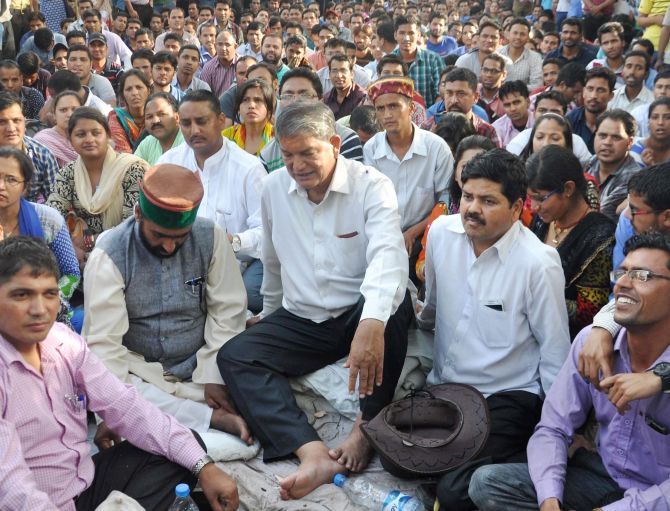'Verdict shows they had illegally imposed President's rule in Uttarakhand.'

An month away from the completion of its second year in office, the Narendra Modi government faced its first legal setback on Thursday, April 21, when the Uttarakhand high court quashed the Presidential notification imposing central rule on the state, revived the Congress government headed by Haresh Rawat, and called for a fresh floor test on April 29.
Lauding the verdict, lawyer-activist Prashant Bhushan tells Syed Firdaus Ashraf/Rediff.com, "The court has done its duty."
How do you see the Uttarakhand verdict? Is it a setback for the Modi government?
Yes, it is definitely a setback for the Modi government.
This verdict shows that they had illegally imposed President's rule on Uttarakhand and they tried to throttle democracy.
The court said on Wednesday that even the President's decision was open to judicial scrutiny.
Yes, that had been said even earlier in the S R Bommai case (S R Bommai versus the Union of India (external link)) by seven Supreme Court judges. They said, yes, President's rule can be reviewed and the President's decision can be set aside by the high court or Supreme Court.
The Bommai verdict does not say that you cannot dismiss a government. The Bommai judgment says that you can dismiss a government; however, that decision is reviewable by the judiciary.
So has the BJP, which while in Opposition criticised the dismissal of elected state governments, failed to learn from history?
At that time the imposition of President's rule was upheld by the Supreme Court. They said the BJP (state) governments supported the demolition of the Babri Masjid, that they were going against the basic structure of the Constitution, secularism. They were supporting heinous activities which were intended to destroy the secular character of country and therefore imposing President's rule was justified.
In the present case, can it be said that the court exceeded its brief and intruded into the territory of the executive?
No, not at all. The court has done rightly, the court has done its duty.
Do you think Article 356 has outlived its utility?
Certainly not. It is still necessary, but it is frequently misused.
What is the best way to ensure, where if a state is ruled by one party and the Centre is ruled by another party, we do not see a political crisis like Uttarakhand in the future?
Behave in a proper manner. The Centre should not try to impose President's rule unless the governance of the state cannot be carried on in accordance with the Constitution.
IMAGE: Uttarakhand Chief Minister Harish Rawat, centre, at a protest rally in Dehradun earlier this week. Photograph: PTI Photo









 © 2025
© 2025